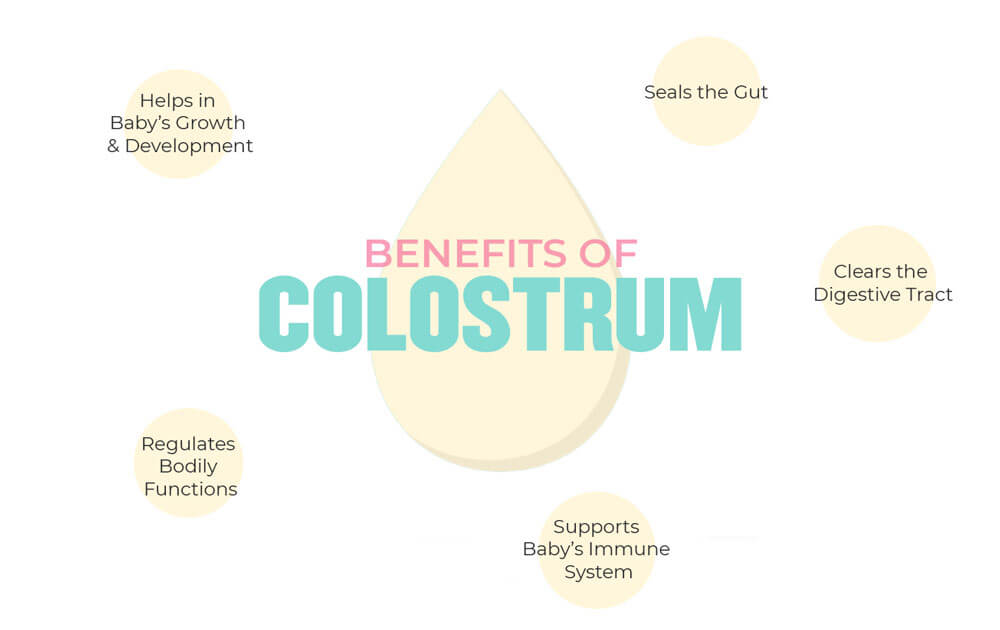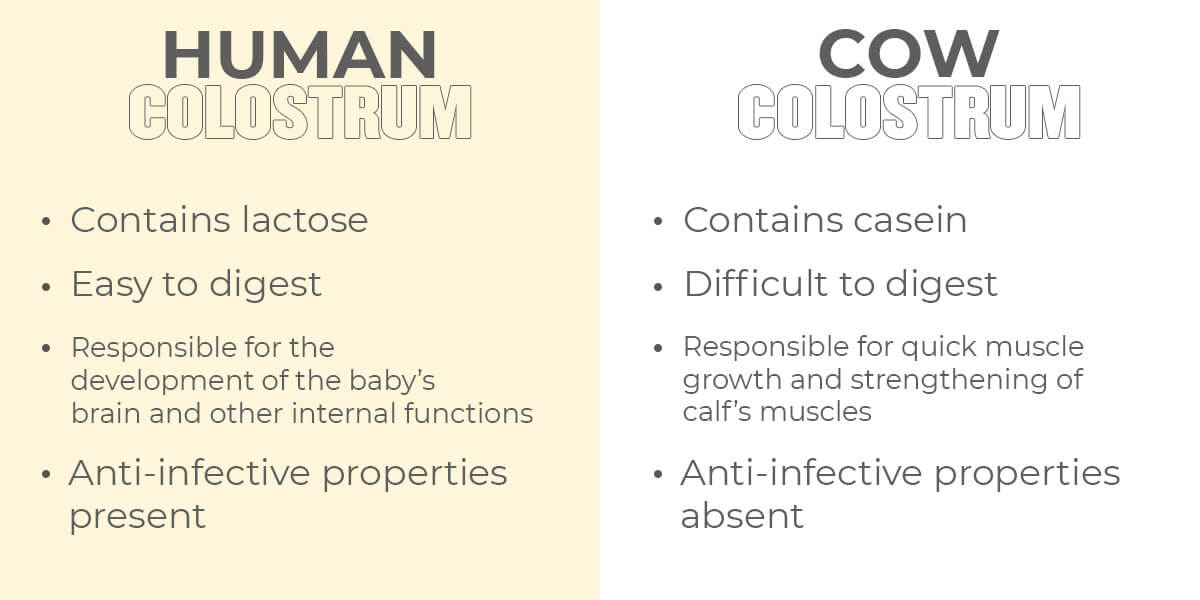What is Colostrum & It’s Benefits

Have you ever come across the phrase “liquid gold” in relation to your breastmilk? If not, then prepare to have your perceptions of breastfeeding your baby change forever when you’re introduced to this substance called colostrum.
Lactation can be a difficult process for new parents – and it is only made harder by the fact that breastmilk can often be extremely unpredictable and vary wildly between different lactating individuals. Colostrum is a part of this lactation process – and it usually comes in right before a steady supply of breastmilk has been established.
So if you’ve been thinking about initially giving your baby conventional formula, then read up about this naturally produced substance and the wonders it can perform for your baby in terms of nutrition!
What is Colostrum?
If you aren’t well acquainted with what is colostrum and why is it important, then you’re going to be surprised by the description. So, what is colostrum? Colostrum milk is usually the substance secreted by mammals before they start lactating – and this substance can be described as being of a thicker composition than breastmilk.
Before the actual process of breastfeeding, it is the thick colostrum that is responsible for giving nutrition to the baby. While it is a common misconception that babies start feeding on breastmilk right away, it is actually the colostrum that sustains them for at least three days after they’re born. There are so many benefits of colostrum that it is often sold as supplements for adults as well.
How is Colostrum Different From Breast Milk?
Observably, colostrum is way thicker than breast milk. However, that’s not where the differences between colostrum and breast milk end. In terms of nutritional composition, colostrum is in fact richer than breast milk. Colostrum, since it is so concentrated, is higher in terms of proteins but lower in fat. This makes colostrum incredibly easy for your baby to digest.
Colostrum also contains white blood cells, and you’ll see further in this article how these help in your baby’s bodily development. While breastmilk is important for your baby’s long-term sustenance, colostrum delivers as many necessary nutrients as possible in the first days of your baby’s life.
Also read: What is Dream Feeding and How to Dream Feed?
How much Colostrum does a Newborn Baby need?
The answer to how much colostrum does a newborn baby need is actually not much. When your baby has just been born, their stomachs will be incredibly small and will not be able to hold more than seven milliliters at a time.
If you feel like you’re not feeding your baby enough for each of their feeding sessions in the initial days after they’re born, don’t worry. Since the composition of colostrum is especially concentrated, that’s another reason to not feed your baby too much in their first days.
The average amount of colostrum produced will be the perfect amount to sustain your baby in their first days, so even a teaspoon’s worth of colostrum is enough!
Benefits of Colostrum

Not only is colostrum extremely healthy in terms of your baby’s development, but it has a myriad of other benefits that you probably didn’t know about. Let’s see what the many colostrum benefits are and how quickly you should switch to it for nutritional sustenance.
1. Helps in Baby’s Growth & Development
While scientists have not finished researching all of the amazing benefits of colostrum, they have certainly come to terms and agreed upon the fact that it is wondrous in a baby’s initial growth and development. Since it is fed to the baby in their first days, it provides a smooth transition from living in the womb and then living in the external world.
This is also helped along by the fact that colostrum contains amniotic fluids, something the womb provided to them for sustenance, so they feel right at home when consuming colostrum. And as mentioned before, it is pretty high in terms of protein content and has minimal lactose, so your baby can digest it with ease.
2. Regulates Bodily Functions
Since your baby has essentially been existing in a protected and safe environment, being taken out of the womb can be a bit jarring to them in terms of physical bodily functions as well.
Luckily, the colostrum is a great regulator for these bodily functions. Not only does it regulate the baby’s body temperature, but it also manages the proper functioning of their lungs, vascular organs, and maintains a state of equilibrium in their internal bodily fluids.
For babies who have been birthed via the process of a c-section, the colostrum is extremely important. Feeding your baby with physical contact can do wonders in regulating both their temperature and their heartbeat.
3. Supports Baby’s Immune System
Since colostrum is responsible for producing a myriad of antibodies, immunoglobulins and contains many white blood cells, it is natural to assume that it supports and strengthens your baby’s immune system tremendously in their early days.
It is also responsible for lining up your baby’s gastrointestinal tract. This helps your baby not contract any diseases or conditions that you might be susceptible to, as these antibodies are passed from the colostrum to the baby’s respiratory and gut lining as well.
Lastly, it is also responsible for building up bacteria in your baby’s gastrointestinal tract which will protect them from several other conditions.
4. Seals the Gut
As mentioned before, colostrum is responsible for strengthening your baby’s immune system by lining up their gastrointestinal and respiratory tract. Before the consumption of colostrum, this lining can be permeated by several bacteria and can leave your baby susceptible to many gut issues in the future such as ADD, asthma, allergies, and such.
Luckily, colostrum lines up your gut and seals it by plugging the “holes” in the gut, all while permeating through the bloodstream of your baby. Hence, it is best to have your baby sustain themselves on colostrum in their first few days.
5. Clears the Digestive Tract
In the initial days of your baby’s life, they need to pass stools in the form of dark and sticky meconium. This clears everything that your baby may have remaining from their time spent in the womb.
However, baby formula may constipate your baby – but this can be avoided by colostrum since it essentially is a laxative that can help your baby poo with ease and get that meconium out of their body.
It also helps prevent jaundice, since it also has the ability to flush out the by-product of the formation of red blood cells in your baby’s body. This by-product is called bilirubin and can be dangerous if built up. Your baby’s liver has not developed enough in order to disintegrate it with ease.
Difference between Human and Cow (Bovine) Colostrum

While human colostrum and cow colostrum (typically called bovine) arises from similar biological functions, they have many intrinsic differences between them.
Firstly, while this may seem obvious, the constituents of human colostrum and bovine are significantly different. While human colostrum contains lactose, bovine, on the other hand, contains casein. The former is responsible for the development of your baby’s brain and other internal functions that are quite complex in the human body.
The latter, on the other hand, is responsible for quick muscle growth and helping strengthen the calf’s muscles. This is primarily due to the fact that every baby calf needs to learn how to move around quickly in order to ensure its survival.
There are other differences such as the presence of immunoglobulins. While human babies receive antibodies from their mother passive through the colostrum, the average baby calf do not unless specifically given bovine colostrum after they’re born; rendering them essentially unable to protect themselves unless they have bovine colostrum in them.
Our Advice
As you have seen, colostrum is insanely important for your baby’s initial development. Even though it feels like you’re only feeding them trace amounts of colostrum at first, trust us, you will sense its benefits in the long run.
Not only is colostrum great in terms of nutrition, but it is recommended by many lactation experts to be the first substance that should be included in your baby’s intake. So while everyone swears by the wonders of breastmilk and how important it is, don’t forget that colostrum is not called liquid gold for nothing!

Laura is a trained primary teacher who takes a profound liking in interacting with and bringing out the best in children. She is also an ISSA certified pediatrician with an extensive practice of over 12 years. Laura comprehends the needs of infants and now compresses her expertise into writing thorough parenting guides to aid new parents.






